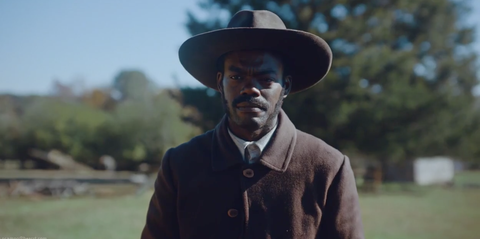The following story contains spoilers for Amazon Prime’s The Underground Railroad.
At first, it’s hard to believe indecisive, neurotic Chidi on The Good Place might one day play a leader and savior, but William Jackson Harper has excelled at it. The 41-year-old actor is starring in the Barry Jenkins-directed series, The Underground Railroad, based upon a Pulitzer Prize-winning novel which re-imagines the railroad as an actual train, traversing tunnels beneath the south.
Harper plays Royal, a freeborn man who helps Cora (Thuso Mbedu) attempt to escape Georgia for freedom while hunted by a merciless slave hunter (Joel Edgerton). The series largely comes to a head in Episode 9, when we witness a brutal massacre on a farm in Indiana. Harper describes his experience filming scenes like these as “triggering.”
“A lot of the times, the people that I was supposed to be mad at in the story—that would carry over,” he tells Men’s Health. “After the tape was done, I was still upset because there’s a lot of really heavy material. ”
We spoke to Harper his breakout success in The Good Place and 2019’s Midsommar, his time on the Amazon Prime series, and the very necessary role karaoke played among the cast.
What drew you to Royal when you first auditioned?
I liked that he sort of lived by his own code in the midst of a time when people weren’t afforded that. He refused to be told what he would and would not do. He’s also such a quiet, confident guy. [It’s] something that I admire, something I’m still trying to be. I think I’m relatively quiet most of the time. Royal is someone I would like to think I have a lot in common with, but I don’t know that I do.
We first meet your character in Episode 6, when Cora’s walking through Tennessee, shackled and following Ridgeway. What do you think Royal’s thought process is when he witnesses her?
To be the most direct about it, what the fuck is this? It’s a certain kind of nastiness to parade a person through a crowded city street in shackles. I don’t want to get too colorful, but [Ridgeway’s] a real piece of work. And then also to see a Black child dressed in some finery, walking with this man and this woman—there’s so many things wrong with that picture. I think it’s highly triggering for Royal. I think it’s unlike anything else that he had seen.
I wonder how you decompressed after filming such heavy scenes.
[The cast] actually all hung out quite a bit. Chase [Dillon’s] mom would would organize bowling nights for us and karaoke nights. And every now and again, we would just like go out, see some music at a bar or something like that. That always helped to just sort of just completely let it go and just see each other as people rather than as [our] characters. That really helped remind us also that we’re all on the same side telling the same story.
What was the most challenging scene to film?
The Indiana Winter episode. Episode 9. That was a really tough episode to shoot. That was the episode where I found myself really upset and angry at people that were just trying to do their job. And I think that it’s one of those episodes that really sticks with me. Even watching it, even though I know it’s coming up, it’s still just breaks my heart. Episode 2 also just really points to the psychological terror of slavery. I was really, really deeply affected by that because [we’re] seeing Cesar and Cora happy for a while. And it’s not what it seems. That just breaks my heart.
How was prepping for this role different from other roles you’ve had?
A lot of reading. [On] The Good Place, it was just like clockwork. We’d been doing it for several years. We know who these characters are and we all understand like what our character would and would not do, especially during the final season. But this is a brand new world and the questions are much bigger.
I’d be remiss not to ask about Midsommar. What was the experience filming that like?
It was very painstaking. Ari Aster had a very specific vision for how his stories are told. The strangest thing was just being in a place where I’d never been to before. We filmed outside Budapest and I was just completely out of my element. I was in a country where none of the letters on any sign made any sense to me. I was just out of my depth.
Did you have any sense while filming that this movie was going to be a cult favorite?
I felt like it would, just because Hereditary was one of my favorite movies. I think it disturbs me when you’re dealing with a belief system and you can’t reason people out of it. You can’t just sort of fight your way out of it. It’s just like, once you’re there, you’re there and you’re having to deal with something that could seem completely irrational and barbaric. I felt like it would find its audience.
This interview was condensed for content and clarity.
This content is created and maintained by a third party, and imported onto this page to help users provide their email addresses. You may be able to find more information about this and similar content at piano.io



